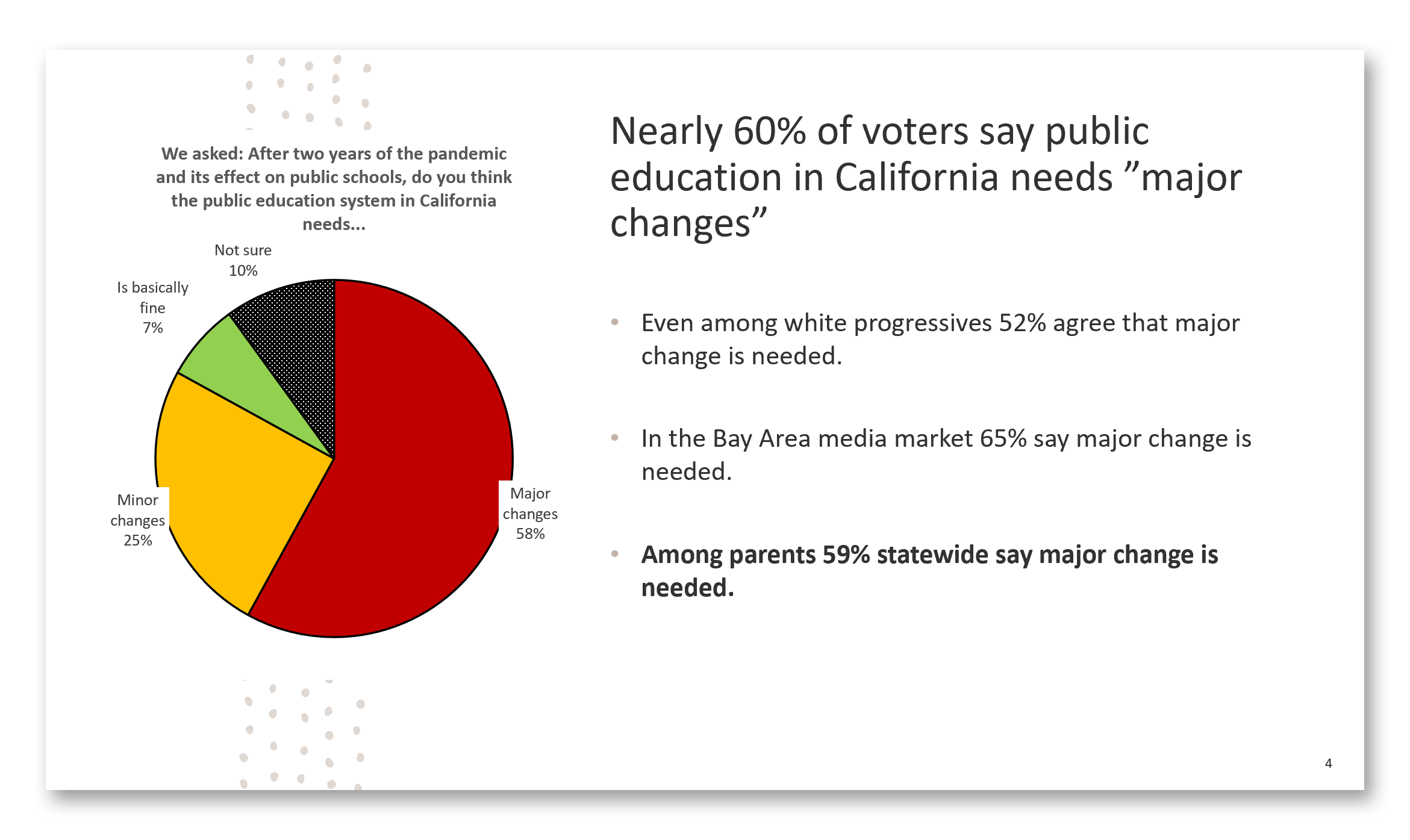Support for charter public schools in the Golden State is at an all-time high, just as parents express wanting “major changes” in the California public education system, according to a new statewide poll by CCSA.
Up eight points from 2020, 55 percent of California voters say they hold a favorable view of charter schools in California, with just less than a quarter of voters reporting an unfavorable view. The more than 2-to-1 favorability is good news for California charters, with room to grow among the undecided respondents.
To take a closer look at the all the findings, click this link to the poll.
"As we commemorate the 30-year anniversary of the passage of the 1992 California Charter Schools Act, we have more reason to celebrate with new polling that finds support for charter schools at a historic high in the Golden State,” said CCSA President & CEO Myrna Castrejón. “Charter public schools were established not to supplant traditional public schools, but to augment their work by providing families with additional public school opportunities to help their child succeed.”

Support for charter schools increases
Public support for charter schools has reached a new high at 55 percent, up eight points since 2020 at 47 percent. We see the strongest support for charter schools is among parents, who support charters at 70 percent, up from 56 percent last year, representing a 14-point increase.
Additionally, the survey finds that charter schools enjoy majority support among Black, white, and Latino voters, and especially among Spanish-speaking Latinos at 63 percent.
A large majority of voters who want “major change” to public education in California also support charter public schools at 63 percent. We also find that voters who want parents to have more influence over public education in California are strong backers of charter public schools at 65 percent.
Voters want “major changes” in public education
The statewide poll conducted June 14 – 24, 2022, finds that Californians have significant concerns about the public education system. Nearly 60 percent of parents say that public education in California needs “major changes” after two years of the pandemic and its effect on schools.
The poll also finds that 58 percent of voters, including 66 percent of parents, say parents have too little influence over California public schools.
Moreover, 66 percent of voters say parents “should have more public school choices,” including 58 percent of Democrats, 81 percent of Republicans, and 66 percent of Independent voters. Seventy-two percent of parents say they should have more public school choices.
“We cannot expect the future leaders of California to succeed in the 21st century with a 19th century education model,” added Castrejón. “A state that is the fifth largest economy in the world needs more public education choices that provides students with the opportunities to help them succeed in school, career, and life.”
Regional support for charter schools
Support for charters schools is highest in the San Diego and Sacramento regions. San Diego support for charter schools is at 64 percent this year, up 14 points from 2020. Sacramento voters support charters at 62 percent, up six points from 2020.
Support in Los Angeles County continues to increase at 52 percent this year, up eight points from 2020. In the Inland Empire (Riverside and San Bernardino Counties), support for charters is at 58 percent, up nine points from 2020.
Support for charters in the Fresno media market holds steady at 58 percent in 2020 and 2022. The San Francisco media market finds a four-point increase in support for charters in 2022 at 46 percent, up four points from 2020.
For a comprehensive look at all the findings, click this link.
About the statewide survey
The poll was conducted by Goodwin Simon Strategic Research consisting of 951 interviews of registered voters between June 14 and June 24, 2022, of all party affiliations. The sample for this survey was drawn from all registered voters in California with a telephone number listed in official county voter files and who have a history of having voted in one or more recent elections or who registered to vote after the November 2020 election. Interviews were conducted in English (92%) and Spanish (8%) with 69% completed online via text invitation and 31% conducted by land and cell phone. The margin of error is +/- 3% at a 95% confidence level.


